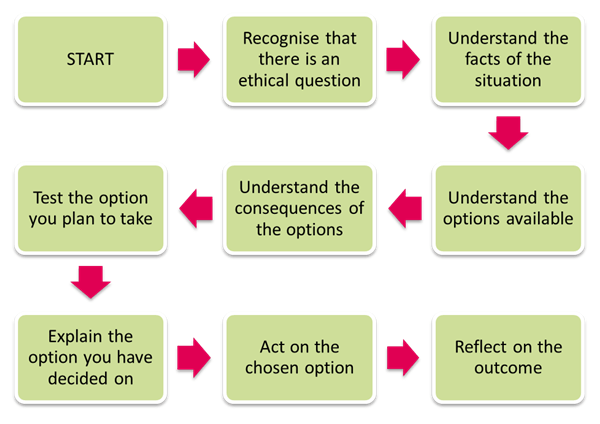Solving ethical problems
When faced with an ethical issue, it is important to remember that there is seldom only one correct way in which to act. The information provided below, however, is intended as a guide to assist you to make professional and ethically responsible decisions.
Note
Making good ethical decisions requires a method for exploring the ethical aspects of a decision, and weighing up the considerations that could influence your choice of action.
The following framework provides a method for exploring ethical dilemmas and identifying ethical courses of action. A Worksheet for Ethical Deliberation has also been developed for advisers.
Ethical decision-making framework
The flowchart below outlines the steps in the ethical decision-making process. Each step is described in further detail below.

Recognising that there is an ethical question:
- requires you to think about how you should act and what you should do in a given situation
- could relate to a situation and/or a decision that you make, which could be potentially damaging to a client or a stakeholder
- could involve a choice between a good and a bad outcome – e.g. a situation where Immigration New Zealand would decline your client’s visa application because of certain information that the client has disclosed to you, but of which Immigration New Zealand is unaware.
Understanding the facts of the situation:
- requires you to consider how you can learn more about the situation including making enquiries and finding additional facts to ensure you have the best possible understanding of the situation.
Understanding the options available to you:
- requires you to identify and understand each option available to you
- requires you to take into account any legislative requirements, professional standards (such as the Code), immigration law and instructions, as these may influence your options.
Understanding the consequences of the options:
- requires you to work out how different parties will be affected by each option - these parties can include the client, stakeholders within the New Zealand immigration system, your employer and other advisers
- requires you to be aware that your overriding duty is always to act in the lawful and legitimate interests of your client
- requires you to ask yourself some searching questions, for example:
- If I am going to act in a way that is adverse to my client’s interests in any way, am I justified in doing so?
- Which option will produce the most good for my client even if it will upset another person or cause me discomfort or loss?
- Will this require me to act in a way that will harm someone else or go against my personal beliefs or ethics?
- Is there a way to act that will not damage my client’s interests but will reduce or prevent harm to another person or institution?
- Is there a way to act that will not damage my client’s interests and will allow me to act in the way I believe is consistent with the type of adviser that I want to be?
Testing the option you plan to take:
- requires you to consider the possible effects of all the different options
- requires you to reflect on and thoroughly review the option that you plan to take – in doing so, you should ask yourself the following questions:
- Am I feeling uncomfortable with what I am about to do?
- If so, why am I feeling uncomfortable about this option?
- Why am I making this decision?
- Would I be happy if this was done to me?
- Would I be happy explaining this to different parties within the New Zealand immigration system and explaining why I did what I am planning to do?
Explaining the option you have decided on to those affected and to other interested parties:
- requires you to act in a way that your client, or another party, may not like or may find difficult to understand
- requires you to be able to justify your actions in a logical and straightforward manner - if you cannot explain your actions, then it is more likely that you are acting on the basis of your feelings or prejudices
- will often require you to have kept excellent records that note the essentials of what the issue was, what you did to resolve it, the options you considered and how you communicated your decision to those affected.
Acting on the chosen option:
- requires you to consider how you will go about implementing your decision
- requires you to actually carry through with the action you decided to take.
Reflecting on the outcome:
- requires you to assess how your decision turned out and what you learnt from this specific situation - to objectively evaluate what has happened and whether the option you took worked.
